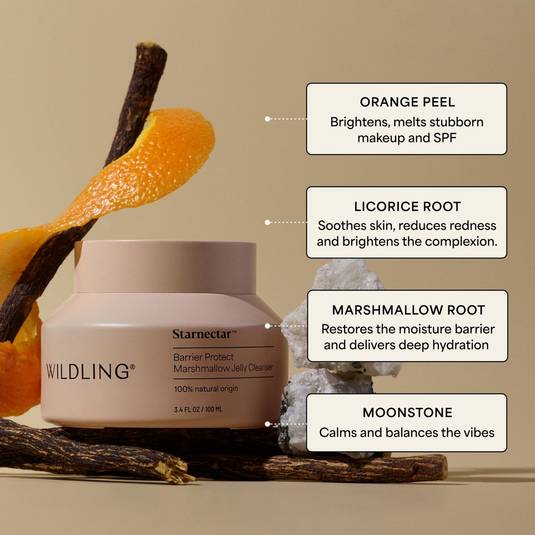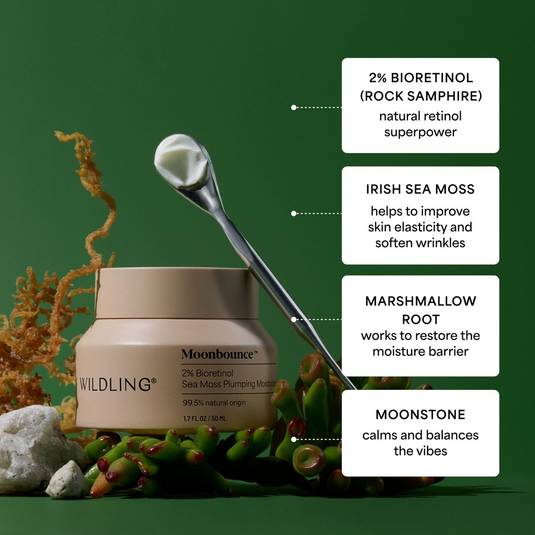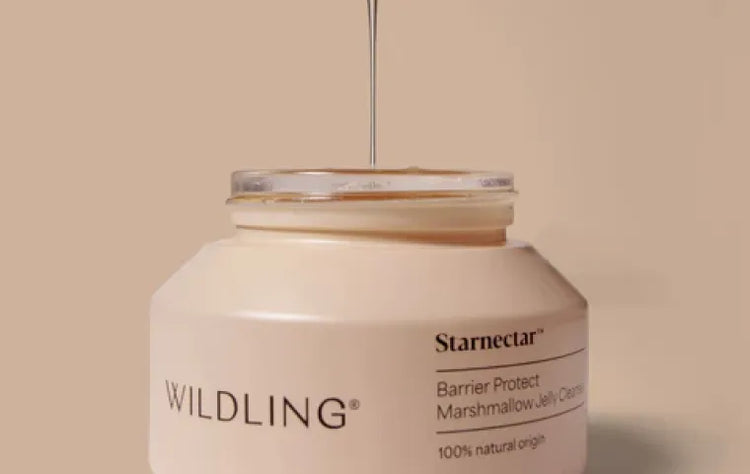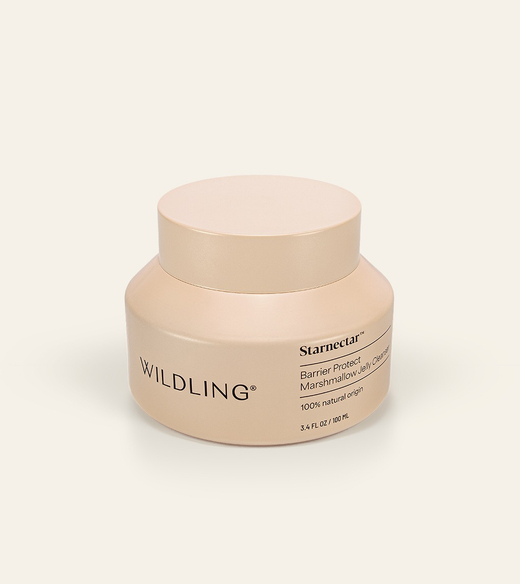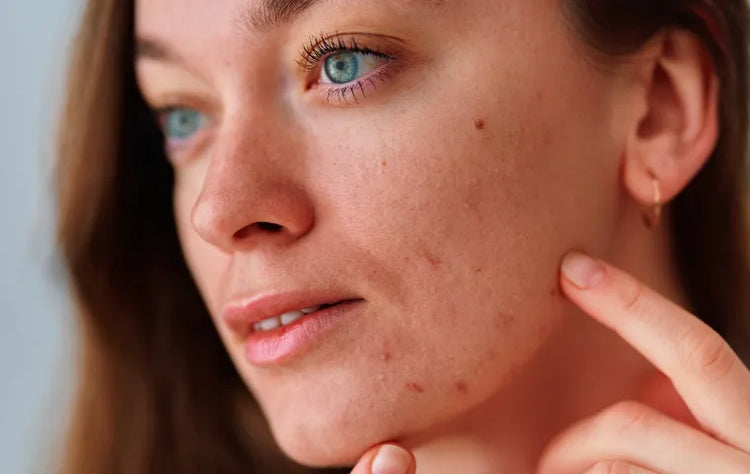When you think of an oily complexion, you might picture the incessant dabbing with blotting papers or the unending search for a mattifying cream that actually works.
But we’ll be honest — an oily face is more than a cosmetic challenge. It's often a frustrating and confusing interplay of factors like genetics, daily skincare routine errors, and even environmental conditions.
If you want to say goodbye to shine and address your oily skin (whether it’s due to environmental issues or is simply a fact of your skin type), let’s talk about what might be causing your oily skin… and then dive into what you can do to restore balance to your complexion.
IS OILY SKIN A BAD THING?
It’s easy to get down on your oily skin if it’s standing between you and a balanced, glowing complexion — especially if it’s causing you practical problems, like running makeup or pilling products. But it’s important to remember that there’s nothing wrong with any skin type! You just may need to make some adjustments to your routine to get the most out of your skin.
Sebum, the oil produced by your sebaceous glands, isn't your skin's foe, but rather an essential component for keeping it hydrated and healthy. Yes, an excess can lead to a plethora of issues, including a shiny T-zone, clogged pores, blackheads, and even painful breakouts… but an excess of most good things can turn bad.
Let's not forget the other end of the spectrum, too. Insufficient sebum production can be equally troublesome, making your skin prone to dryness, flaking, redness, and premature aging.
Striking a balance between too much and too little oil is crucial, but finding that middle ground is often easier said than done. Hormonal fluctuations, life stage changes, and even seasonal shifts can interfere with your sebum production.
That's why it's vital to understand the variables in play and tailor your skincare routine accordingly. With the right approach, you can achieve a skin texture that is neither too oily nor too dry but just right.
SO, WHY IS YOUR SKIN SO OILY?
If you’re working hard for a blemish-free, matte complexion, it's essential to identify the contributing factors. Let’s walk through some key elements that could be throwing your sebum production out of wack.
Genetics
Not only do you inherit your parents' eye color and height, but your skin type, too, is a genetic legacy. In other words — your skin's sebum? That's often penned by family genes.
When it comes to the amount of oil your skin produces, it’s likely similar to the balance found in your close relatives’ skin.
There’s a significant genetic factor at play in determining the activity of your sebaceous glands. If oiliness is a family trait, you may want to consult a dermatologist for a skincare routine designed specifically for your skin type, because it’s likely just a fact of your complexion’s special make up, not something you’re going to change with home remedies.
Skipping Moisturizer
It's a common misconception that moisturizers worsen oily skin. When skin feels like the Sahara, your sebaceous glands go into overdrive, thinking they’re doing you a favor.
The result? Extra oil.
Using a light, water-based, oil-free moisturizer can help maintain your skin’s hydration without adding extra oil. Look for products marked non-comedogenic to make sure they won't clog your pores. We recommend our Moonbounce 2% bio retinol sea moss plumping moisturizer for a lightweight nourishing hydration that won’t leave you shiny.
Using the Wrong Skincare Ingredients
In the quest for oil-free skin, many people make the mistake of using harsh astringents or alcohol-based toners. These products can totally strip the skin of its natural oils, tricking sebaceous glands into producing more oil. Instead, try to switch to a gentle cleanser and toner that preserves your skin's natural moisture while still clearing away excess sebum.
Environment and Climate
While we may love basking in the warm sun, higher temperatures and increased humidity levels can actually spur our oil glands into action. And again, the result is excess sebum production, which exacerbates oily skin issues.
In these conditions, aim to change up your skincare routine to include mattifying creams and blotting papers that help manage shine.
Diet
What you put in your mouth can manifest on your skin. Consuming high levels of alcohol, meats, and dairy products has been linked to elevated oil production. But here's the silver lining: by embracing a diet sprinkled with fresh produce and lean proteins, you're on the path to balanced sebum.
Stress
Let's spill: when the weight of the world's on your shoulders, your skin might just be catching those vibes. When you're stressed, your body produces more cortisol — a hormone that indirectly encourages oil production. Managing stress through exercise, meditation, or other relaxation techniques can help regulate cortisol levels and, consequently, diminish oil production.
Hormones
Hormones, particularly androgens, are the behind-the-scenes operators regulating your oil glands. Fluctuations in hormone levels, whether due to the menstrual cycle, pregnancy, or medications, can lead to increased sebum production. For hormone-related oiliness, consult a dermatologist who may recommend topical treatments or other therapies.
WHAT CAN YOU DO ABOUT OILY SKIN?
So, where does this leave us? With insight and the right skincare allies, you're not just managing — you're thriving.
Just keep in mind that the goal isn’t to fundamentally change your skin by overloading it with intense ingredients like salicylic acid or benzoyl peroxide. The goal is to work with your skin type to help bring it into equilibrium. Here's your roadmap to navigating oily skin with grace and efficacy.
1. Make Some Lifestyle Changes
While genetics and hormones are often the primary culprits, your lifestyle choices also hold significant sway over your skin's oil production, as we talked about. Aim to cut back on greasy food, sugary treats, and alcoholic beverages in favor of fruits, vegetables, and lean proteins.
Regular exercise also helps with regulating hormones and reducing cortisol levels, thus helping to control sebum production. When it comes to diet and activity, what’s good for your body often benefits your skin as well!
2. Avoid Over-Cleansing
It's tempting to wage war on oily skin by scrubbing it into submission… and this temptation is encouraged by drugstore face wash options or foaming scrubs that claim to clear away all pimples.
However, over-cleansing can backfire, stripping your skin of essential oils and prompting it to produce even more sebum. Our flagship product, Starnectar™ Barrier Protect Marshmallow Jelly Cleanser, offers a kinder approach.
Formulated with marshmallow root, licorice root, and orange peel, this gentle cleanser dissolves makeup and impurities while keeping your skin’s natural barrier intact. When you keep hydration in balance, you reduce the need for compensatory oil production.
3. Skip Harsh Treatments
In the quest for oil-free skin, people often resort to abrasive peels or exfoliating methods that do more harm than good. These ingredients may strip your skin, leaving your complexion desperate for hydration — which ironically can spur additional oil production.
So leave behind potentially abrasive retinol and take a kinder approach. Our Moonbounce™ 2% Bio Retinol Irish Sea Moss Plumping Moisturizer. It utilizes the power of bio-retinol and Irish Sea Moss to minimize wrinkles and firm your skin without causing inflammation or irritation.
Apply this nourishing, naturally formulated moisturizer with our Reflexology Spoon for a self-care ritual that can bring balance to your oily skin.
4. Use the Right Moisturizer
The paradox of oily skin often lies in its dehydration. Your skin may be producing excess oil as a desperate attempt to lock in moisture. The key is to find a moisturizer that hydrates without adding to your skin's oiliness.
Look for water-based, oil-free formulas that will add the necessary hydration without exacerbating oil production. Non-comedogenic options are also a wise choice, as they don’t clog pores or lead to breakouts.
5. Sun Protection Is Key
Slathering on the wrong sunscreen can turn your oily skin into a greasy mess real quick. Instead, opt for formulations specifically designed for oily or acne-prone skin. Non-comedogenic, water-based sunscreens offer substantial protection without leaving your skin looking like an oil slick.
Also, don’t forget to look for products with a high SPF level for optimum protection from harmful UV rays. Sun protection is non-negotiable; the trick lies in selecting a product that complements your skin type.
6. Manage Your Stress
Your skin is a reflection of your inner well-being. Elevated stress levels can spike hormone production, leading to a surge in oil production and an increased risk of acne.
Stress-management techniques, whether it's through regular exercise, meditation, or hobbies that make you happy, can substantially contribute to a balanced, less oily complexion. Taking time for self-care is not merely a luxury; it’s an investment in the health of your skin.
MATTE ABOUT YOU
The road to achieving a balanced complexion when contending with oily skin isn't merely about selecting a mattifying product off a drugstore shelf. It's a holistic endeavor that takes into account genetics, lifestyle choices, and the intricate biochemistry of your skin.
A targeted skincare routine incorporating a gentle cleanser, the appropriate moisturizer, and a non-comedogenic sunscreen can spell the difference between endless blotting paper cycles and radiant, balanced skin. As you read and adapt these insights to suit your specific needs, remember that the journey to beautiful skin is a continuous process, one that rewards attention to detail and persistent care.
Sources:
Oily Skin: A Review of Treatment Options | National Library of Medicine
Oily Skin: An Overview | National Library of Medicine
How To Control Oily Skin | American Academy of Dermatology Association
Profiling and Hormonal Therapy for Acne in Women | National Library of Medicine
Formulated with marshmallow root, licorice root, and orange peel, this gentle cleanser dissolves makeup and impurities while keeping your skin’s natural barrier intact.
